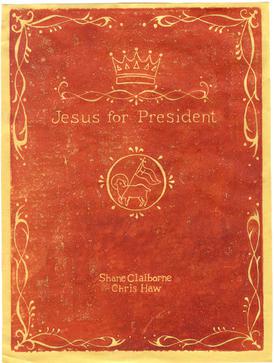 https://en.wikipedia.org/wiki/Jesus_for_President
https://en.wikipedia.org/wiki/Jesus_for_PresidentJesus for President: Politics for Ordinary Radicals is a 2008 book co-authored by Shane Claiborne and Chris Haw, key figures in the New Monasticism movement. The book critiques how American Christians often ignore the countercultural themes of Jesus' ministry, such as self-denial, due to their comfort with Christian privilege.
The book received positive reviews from both secular and Christian critics. David Swanson, in a three-part review for Christianity Today, commended the authors for highlighting the church's overly close relationship with the state. Conversely, Mark Tooley of the Institute on Religion and Democracy criticized the book for its pacifism, labeling it utopian and anti-American.
**Background**
"Jesus for President" was first published in March 2008 and sold over 300,000 copies by December of the same year. Claiborne and Haw met in the early 2000s while living in different Christian intentional communities. Claiborne's first book, "The Irresistible Revolution: Living as an Ordinary Radical," was published in 2006. At the time of "Jesus for President"'s release, Haw was a theology graduate student at Villanova University. Claiborne clarified that the book’s title should not be taken literally, as Jesus' political manifesto would not suit a superpower.
The book became a bestseller, with all proceeds supporting the Jubilee Fund, a nonprofit organization founded by Claiborne to support international community projects. An audiobook edition was released in 2009.
**Content**
"Jesus for President" presents a series of loosely interrelated narratives combining practical theology, biblical theology, ecclesiastical history, contemporary stories, political manifesto, and Bible stories. It draws on both the Old and New Testaments, frequently quoting Church Fathers like Justin Martyr and Tertullian.
The book aims to present scholarly findings on the New Testament's teachings on empire accessibly. It likens Jesus to an American political candidate, identifying Luke 4:18–19 as his campaign commencement speech, "Jubilee" as his slogan, and ancient Jubilee economics as his platform. The authors argue that the church often prioritizes conforming its members to the state over the Kingdom of God and warn against the allure of political and financial power. Although advocating for countercultural living in accordance with Jesus' teachings, the authors do not prescribe specific actions for Christians or suggest restructuring the U.S. economic or political systems.
Promoting pacifism, the book criticizes the 2003 invasion of Iraq and discusses liberation theology. It is divided into four chapters: the first two provide a New Monastic summary of the Bible, the third discusses the implications for American citizens, likening them to members of the Roman Empire, and the fourth illustrates Christians living counterculturally, modeling divine redemption. This chapter also includes stories on heterodox economics, defending the homeless, Amish forgiveness, dumpster diving, missional robotics, Martin Luther King Jr., anti-war protests, and The Simple Way.


